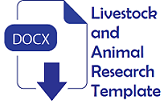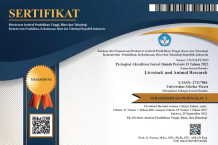Ongole Crossbreeds conservation with the existence value approach and the willingness to pay farmers in Yogyakarta Indonesia
Abstract
Objective: The objective of the research was to identify and measure the value of existence, thus to analyze Willingness To Pay of farmer to keep the existence of Ongole Crossbreeds.
Methods: The research was conducted in the Independent Taruna Group, Ngemplak District, Sleman Regency with the consideration that it is a PO cattle group that has the largest number of members in Sleman Regency. Determination of respondents by census as many as 40 farmers. Data was collected through interviews using a questionnaire as a research instrument. The identification of the existence of the business includes the availability of inputs, the development of outputs and the accessibility of supporting PO cattle using a Likert scale. Testing the consistency of statement items is tested for validity and reliability. The Contingent Valuation method is used to estimate the Willingness to Pay of farmers in maintaining their business.
Results: The value of business sustainability from the existence of input (0.896), output (0.985), and support (0.885) is in the high category. The largest WTP value is the purchase of young female cattle with an average value of IDR 14.500.000/head, followed by waste treatment of IDR. 11,509,000/year and parent insurance of IDR. 40,000/head/year. The aggregate value of the group's WTP is IDR. 1,350,000,000/year.
Conclusions: Livestock groups can maintain the existence of PO cattle because of the support of business existence, utilization of dung waste to increase income, and Willingness To Pay farmers. On the other hand, government support to provide subsidies and Siwab or its extension Mandatory cattle breeding is maintained to maintain the presence of PO cattle
Keywords
Full Text:
PDFReferences
- Supartini, N., and H. Darmawan. 2014. Profil genetik dan peternak sapi peranakan ongole sebagai strategi dasar pengembangan Desa Pusat Bibit Ternak. Buana Sains. 14: 71-84. Doi: dx.doi.org/10.33366/bs.v14i1.83
- Kurniawan, E., Sulastri, dan Adhianto. 2021. Perbandingan performa pertumbuhan pada Sapi Peranakan Ongole di Desa Purwodadi dalam dan Desa Wawasan, Kecamatan Tanjungsari, Kabupaten Lampung Selatan. J. Ris. dan Inov. Peternak. 5:57-63. Doi: doi. org/10.23960//jrip.2021.5.1.57-63
- Yulyanto, C. A., T. Susilawati, dan M. N. Ihsan. 2014. Penampilan reproduksi sapi Peranakan Ongole (PO) dan sapi Peranakan Limousin di Kecamatan Sawoo Kabupaten Ponorogo dan Kecamatan Tugu Kabupaten Trenggalek. J. Ilmu-Ilmu Peternak. 24: 49-57.
- Rohayati, T., dan R. F. Christi. 2017. Penampilan reproduksi Sapi Peranakan Ongole Dara. J. Ilmu Peternak. 1: 7-14. Doi: dx.doi.org/10.52434/janhus.v1i2.241
- Rouf, A. A., dan S. Munawaroh. 2016. Technical efficiency analysis and The determinants of inefficiency factors of beef cattle fattening in Gorontalo District. J. Pengkaj. dan Pengemb. Teknologi Pertan. 19: 103-118. Doi: 10.21082/jpptp.v19n2.2016. p103-118
- Sutarno, dan A. D. Setyawan. 2016. Review: The diversity of local cattle in Indonesia and the efforts to develop superior indigenous cattle breeds. Biodiversitas. 17: 175-295. Doi: 10.13057/biodiv/d170139
- Octarina, T., C. Meidiana, dan A. R. R. T. Hidayat. 2016. Perbandingan kemampuan dan kemauan membayar peternak non biogas di Dusun Krajan, Desa Pujon Kidul. J. Tata Kota dan Drh. 8: 63-70.
- Kementerian Pertanian. 2020. Statistik Peternakan dan Kesehatan Hewan. Statistik Peternakan dan Kesehatan Hewan 2020. Direktorat Jenderal Peternakan dan Kesehatan Hewan, Jakarta. p. 236.
- Hakim, A. R., Sumartono, dan B. S. Haryono. 2015. Partisipasi masyarakat dalam formulasi perencanaan program peningkatan populasi dan performance Sapi Madura melalui inseminasi buatan. J. Ilm. Ilmu Sos. dan Ilmu Polit. 5: 125-35. Doi: dx.doi.org/10.33366/ rfr.v5i1.70
- Badan Pusat Statistik Kabupaten Sleman. 2021. Kabupaten Sleman Dalam Angka. Badan Pusat Statistik Kabupaten Sleman, Yogyakarta. p. 284.
- Zander, K. K. 2013. Understanding public support for indigenous natural resource management in northern Australia. Ecology and Society. 18(1): 1-14. Doi: dx.doi. org/ 10.5751/ES-05267-180111
- Monintja, M. Y., F. S. Oley, B. F. Sondakh, dan F. N. S. Oroh. 2015. Analisis keuntungan peternak sapi peranakan ongole (PO) yang menggunakan inseminasi buatan (IB) di Kecamatan Tompaso Barat. Jurnal Zootek. 35(2): 201-209. Doi: doi.org/10.35792/zot.35. 2.2015.7574
- Martha, A. D., D. Haryono, and L. Marlina. 2020. Analisis pendapatan dan tingkat kesejahteraan rumah tangga peternak sapi potong Kelompok Ternak Limousin Desa Astomulyo Kecamatan Punggur Kabupaten Lampung Tengah. J. Ilmu Peternak. Terpadu. 8: 77-82. Doi: 10.23960/jipt.v8i2.p77-82
- Shahzad, M. A., S. Abubakr, and C. Fischer. 2021. Factors affecting farm succession and occupational choices of nominated farm successors in Gilgit-Baltistan, Pakistan. Agriculture. 11: 1-17. Doi: doi.org/ 10.3390/ agriculture11121203
- Aiba, A., J. C. Loing, B. Rorimpandey, dan L. S. Kalangi. 2018. Analisis pendapatan usaha peternak sapi potong di Kecamatan Weda Selatan Kabupaten Halmahera Tengah. Zootec. 38: 149-159. Doi: 10.35792/zot.38.1. 2018.18622
- Sarma P., S. Raha, and H. Jørgensen. 2014. An economic analysis of beef cattle fattening in selected areas of Pabna and Sirajgonj Districts. J. Bangladesh Agric. Univ. 12: 127-34. Doi: 10.3329/jbau.v12i1. 21402
- Bere, M. F. 2019. Analisis usaha penggemukan Sapi Bali di Kelompok Tani Bero Sembada Kecamatan Laen Mane Kabupaten Malaka. J. Anim. Sci. 4: 26–29. Doi: 10.32938/ja.v4i2.623
- Priyanti, A., I. G. A. P. Mahendri, F. Cahyadi, and R. A. Cramb. 2012. Income over feed cost for small- to medium-scale beef cattle fattening operations in East Java. J. Indones. Trop. Anim. Agric. 37: 195-201. Doi: 10.14710/jitaa.37.3.195-201
- Kamal M., M. Hashem, M. A. Mamun, M. Hossain, and M. Razzaque. 2019. Study of cattle fattening system in selected region of Bangladesh. SAARC J. Agric. 17: 105-118. Doi: 10.3329/sja.v17i1.42765
- Novanda, R. R., and M. Khaliq. 2020. Influencing factors of madura cattle farmers’ courage to face risks of breeding. IOP Conf. Ser. Earth Environ. Sci. 782: 1–6. Doi: 10.10 88/1755-1315/782/2/022027
- Sari, E. C., M. Hartono, dan S. Suharyati. 2016. Faktor- faktor yang memengaruhi service per conception sapi perah pada peternakan rakyat di Provinsi Lampung. J. Ilm. Peternak. Terpadu. 4: 313-318. Doi: dx. doi.org/10.23960/jipt.v4i4.p%25p
- Gunawan, A, A. Sodiq, K. Muatip, and N. A. Setianto. 2020. Reproductive performance of beef cattle raised under SPR program in Tegal Regency. Bull. of Anim. Sci. 44: 27-34. Doi: doi.org/10.21059/ buletinpeternak.v44i1. 46127
- Bhaskara, A. P., T. W. Suprayogi, R. Darsono, P. Srianto, M. Hariadi, dan T. Sardjito. 2018. Conception rate dan service per conception pada Sapi Peranakan Limousin dan Sapi Peranakan Ongole hasil IB di Kecamatan Pilangkenceng Kabupaten Madiun. OVOZOA: J. of Anim. Reproduction. 7: 152-155. Doi: dx.doi.org/ 10.20473/ovz.v7i2. 2018.152-155
- Baliarti, E., B. A. Atmoko, F. Aryanti, N. N. Ngadiono, I. G. S. Budisatria, T. S. M. Widi, M. D. E. Yulianto, and S. Bintara. 2015. Age and body weight at puberty and service per conception of Ongole Crossbred Heifer on smallholder farming system. Integrated Approach in Developing Sustainable Tropical Animal Production. The 6th International Seminar on Tropical Animal Production. Yogyakarta.
- Agustine, R., S. Bintara, S. Andarwati, M. A. U. Muzayyanah, T. S. M. Widi, and A. R. S. Putra. 2019. Analysis in making decision of farmer to select bull frozen semen in Indonesia. J. Indonesian Trop. Anim. Agric. 44: 323-332. Doi: 10.14710/jitaa.44. 3.323-332
- Ningsih, U. W., B. Hartono, dan E. Nugroho. 2017. Analisis pemasaran sapi potong melalui analisis marjin, transmisi harga, struktur pemasaran, perilaku pemasaran dan kinerja pemasaran. J. Ilmu-Ilmu Peternak. 27: 1-11. Doi: 10. 21776/ub. jiip.2017.027.01.01.
- Rusdiana, S., dan N. Soeharsono. 2018. Program SIWAB untuk meningkatkan populasi sapi potong dan nilai ekonomi usaha ternak. Forum penelitian Agro Ekonomi. 35: 125-137. Doi: dx.doi.org/10. 21082/fae.v35n2.2017.125-137
- Muriithi, B. W., N. G. Gathogo, G. M. Diiro, M. M. Kidoido, M. N. Okal, and D. K. Maasiga. 2021. Farmer perceptions and willingness to pay for novel livestock pest control technologies: A case of tsetse repellent collar in Kwale County in Kenya. PLOS Neglected Tropical Dis. 15: 1-21. Doi: doi. org/10.1371/journal.pntd.0009663
- Sirajuddin, S. N., I. Sudirman, L.D. Bahar, A. R. Al Tawaha, and A. R. Al-Tawaha. 2018. Social economic factors that affect cattle farmer’s willingness to pay for artificial insemination programs. Bulg. J. Agric. Sci. 24: 574-580.
- Ningsi, R., A. Asnawi, and A. Abdullah. 2020. Effect of intrinsic factors on farmers’ willingness to pay on the success of artificial insemination of Bali cattle. IOP Conf. Ser. Earth Environ. Sci. 492: 15. Doi: 10.1088/1755-1315/492/1/012161
Refbacks
- There are currently no refbacks.










